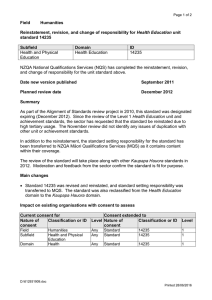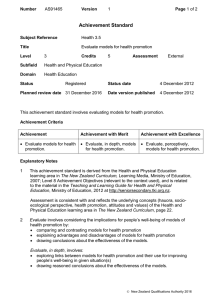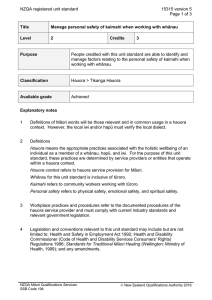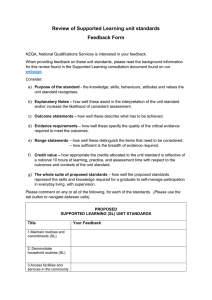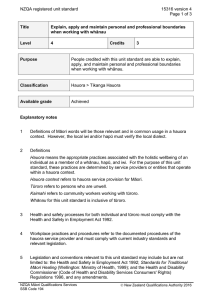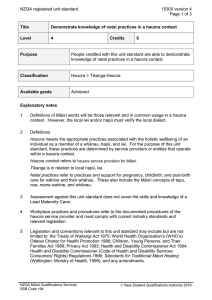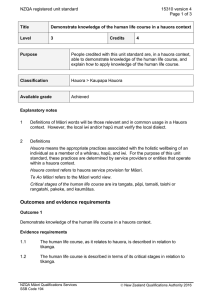NZQA registered unit standard 18564 version 3 Page 1 of 3
advertisement
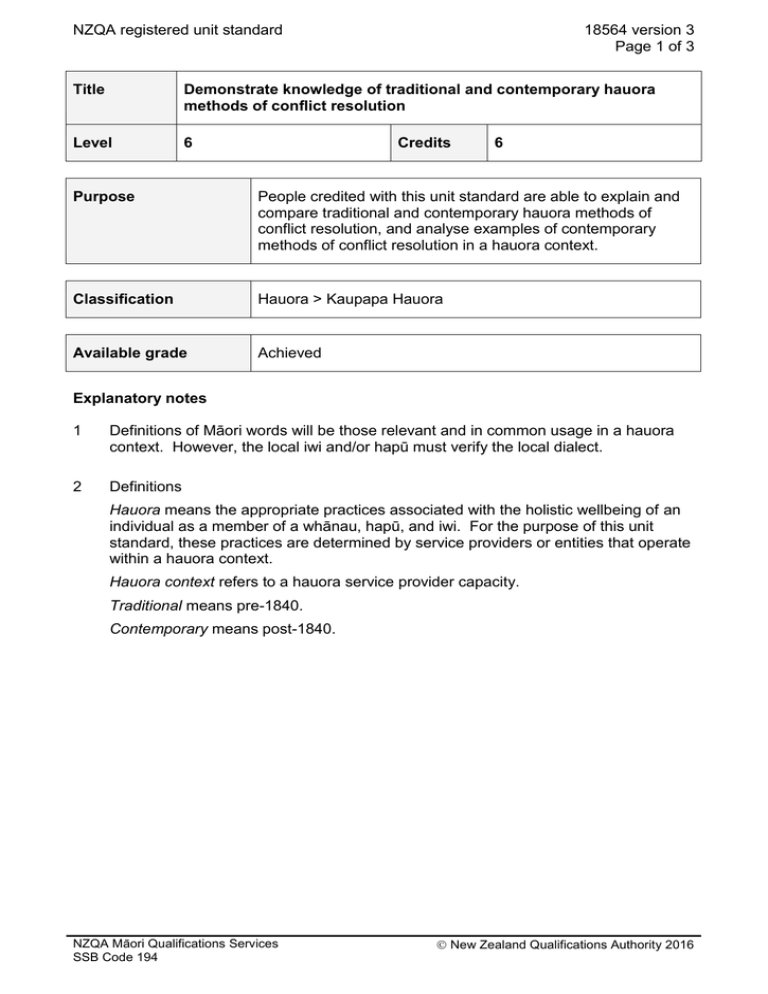
NZQA registered unit standard 18564 version 3 Page 1 of 3 Title Demonstrate knowledge of traditional and contemporary hauora methods of conflict resolution Level 6 Credits 6 Purpose People credited with this unit standard are able to explain and compare traditional and contemporary hauora methods of conflict resolution, and analyse examples of contemporary methods of conflict resolution in a hauora context. Classification Hauora > Kaupapa Hauora Available grade Achieved Explanatory notes 1 Definitions of Māori words will be those relevant and in common usage in a hauora context. However, the local iwi and/or hapū must verify the local dialect. 2 Definitions Hauora means the appropriate practices associated with the holistic wellbeing of an individual as a member of a whānau, hapū, and iwi. For the purpose of this unit standard, these practices are determined by service providers or entities that operate within a hauora context. Hauora context refers to a hauora service provider capacity. Traditional means pre-1840. Contemporary means post-1840. NZQA Māori Qualifications Services SSB Code 194 New Zealand Qualifications Authority 2016 NZQA registered unit standard 18564 version 3 Page 2 of 3 Outcomes and evidence requirements Outcome 1 Explain traditional and contemporary hauora methods of conflict resolution. Range evidence of two traditional and two contemporary methods is required. Evidence requirements 1.1 Traditional hauora methods of conflict resolution are explained in accordance with tikanga and kawa. Range 1.2 traditional methods may include but are not limited to - karakia, hui, muru, kōrero kanohi ki te kanohi, utu, mārena tomo, pakanga, mākutu. Examples of contemporary hauora methods of conflict resolution are provided, and are explained in accordance with tikanga and kawa. Range contemporary methods may include but are not limited to karakia, hui, muru, kōrero kanohi ki te kanohi, support service interventions. Outcome 2 Compare traditional hauora methods of conflict resolution with contemporary hauora methods of conflict resolution. Evidence requirements 2.1 Traditional and contemporary methods of conflict resolution are compared in terms of the key features of each type of method. Range 2.2 key features may include but are not limited to - methodologies, practices, roles and responsibilities, values; evidence of three is required. Traditional and contemporary methods of conflict resolution are compared in terms of the appropriate use of each type of method. Outcome 3 Analyse examples of contemporary methods of conflict resolution in a hauora context. Range evidence of three examples of conflict resolution in three different hauora contexts is required. Evidence requirements 3.1 Examples are analysed, and the issues, processes, and desired outcomes for each example are examined. NZQA Māori Qualifications Services SSB Code 194 New Zealand Qualifications Authority 2016 NZQA registered unit standard 18564 version 3 Page 3 of 3 3.2 Roles and responsibilities of people involved in each example are identified. 3.3 External factors that influence the outcome in each example are identified. Planned review date 31 December 2016 Status information and last date for assessment for superseded versions Process Version Date Last Date for Assessment Registration 1 18 December 2002 31 December 2012 Review 2 20 August 2010 N/A Rollover 3 10 December 2015 N/A Consent and Moderation Requirements (CMR) reference 0165 This CMR can be accessed at http://www.nzqa.govt.nz/framework/search/index.do. Please note Providers must be granted consent to assess against standards (accredited) by NZQA, before they can report credits from assessment against unit standards or deliver courses of study leading to that assessment. Industry Training Organisations must be granted consent to assess against standards by NZQA before they can register credits from assessment against unit standards. Providers and Industry Training Organisations, which have been granted consent and which are assessing against unit standards must engage with the moderation system that applies to those standards. Requirements for consent to assess and an outline of the moderation system that applies to this standard are outlined in the Consent and Moderation Requirements (CMR). The CMR also includes useful information about special requirements for organisations wishing to develop education and training programmes, such as minimum qualifications for tutors and assessors, and special resource requirements. Comments on this unit standard Please contact the NZQA Māori Qualifications Services mqs@nzqa.govt.nz if you wish to suggest changes to the content of this unit standard. NZQA Māori Qualifications Services SSB Code 194 New Zealand Qualifications Authority 2016
